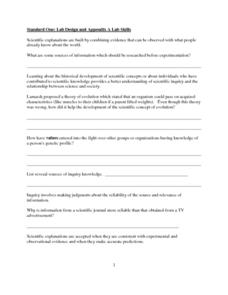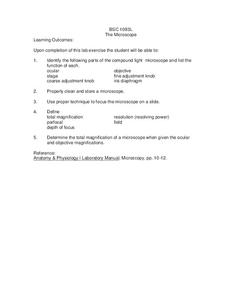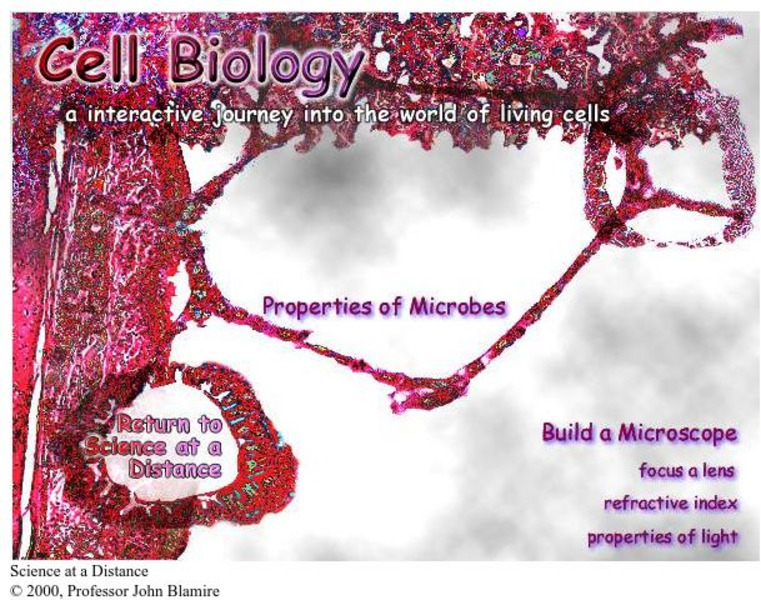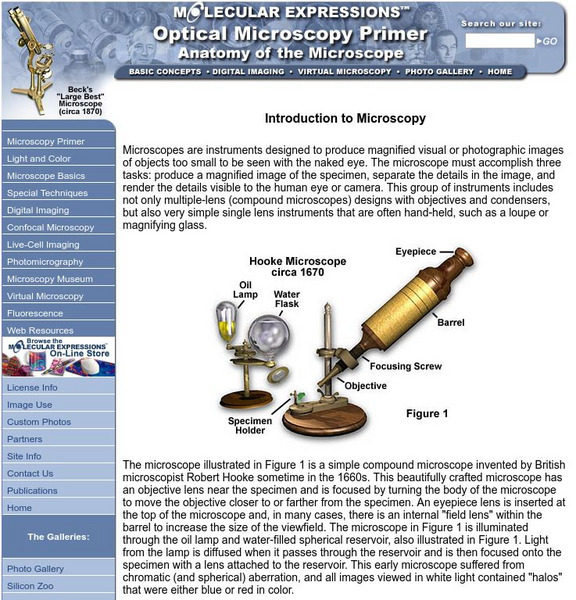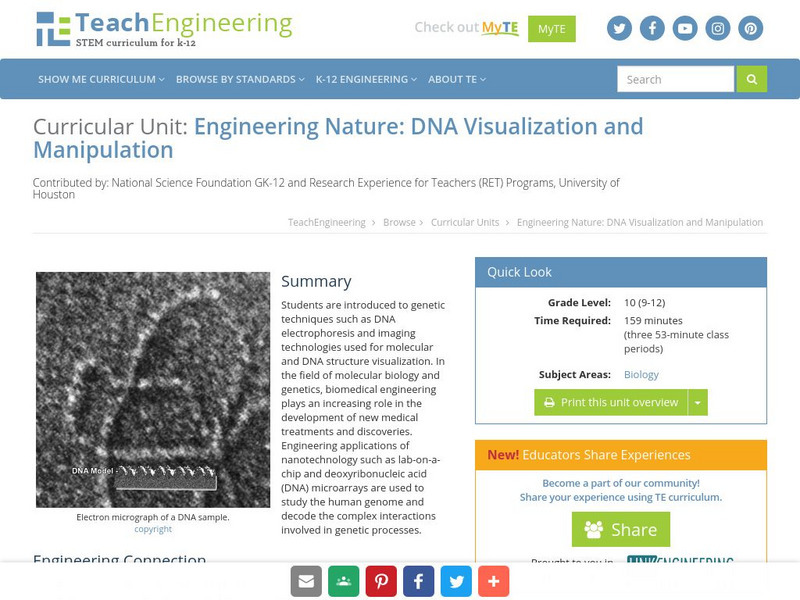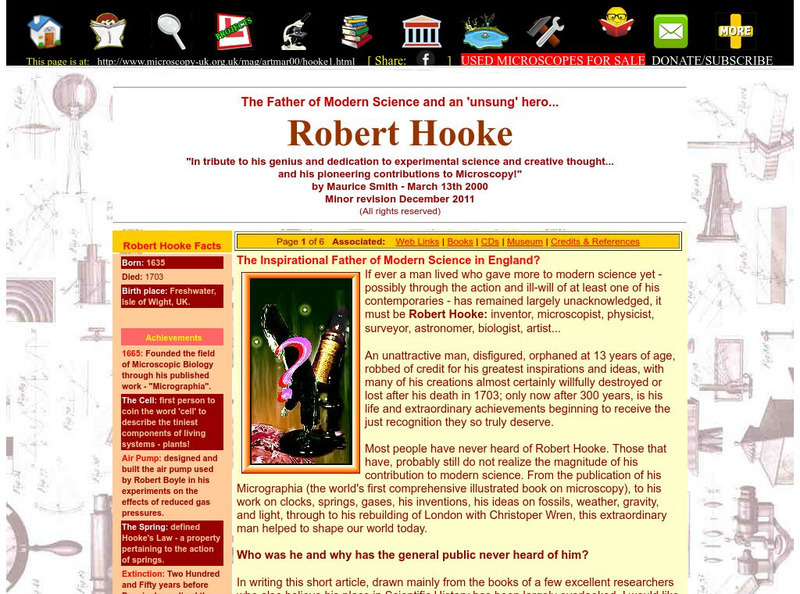Curated OER
Forensics Crime Lab
Students brainstorm ways to look for evidence and investigate suspects. For this investigative lesson students pretend to be investigators and analyze a crime scene.
Curated OER
Standard One: Lab Design and Appendix A Lab Skills
In this lab design and lab skills worksheet, students answer questions about experimental design including finding variables, determining controls, and graphing data. They answer questions about microscopy and label the parts of a...
Curated OER
The Microscope
In this microscope lesson plan students explore the compound light microscope. Students discover techniques concerning cleaning, storage and proper use of the microscope. Students discover the working parts of the compound light...
Curated OER
Microscopes Online
In this microscopes worksheet, students access a website to complete questions about the early compound microscopes and the scientist involved in the development. This worksheet has 1 graphic organizer, 7 fill in the blank, and 10 short...
City University of New York
Cell Biology: An Interactive Journey
This interactive website about microscopes and microbes provides students with an introduction to cellular biology.
Florida State University
Florida State University: Magnification Module
Explore the effect of increasing the magnification on a microscope when viewing various samples such as onion root mitosis.
TED Talks
Ted: Ted Ed: The Story Behind Your Glasses
Video describes the developments and advancements in the history of the study of optics. [4:17] Includes a short quiz and a list of additional resources to explore.
Florida State University
Florida State University: Introduction to Microscopy
A thorough introduction to the structure and function of microscopes. Identify types and parts of the scientific tool. Utilize interactives to strengthen understanding.
Microscopy UK
Microscopy Uk: Micscape Magazine
Get up to date on all things microscopic with Micscape Magazine online.
TeachEngineering
Teach Engineering: Engineering Nature: Dna Visualization and Manipulation
Students are introduced to genetic techniques such as DNA electrophoresis and imaging technologies used for molecular and DNA structure visualization. In the field of molecular biology and genetics, biomedical engineering plays an...
Other
Nikon: Nikon Small World: Photomicrography Competition
Nikon has, for years, sponsored a competition to showcase the work of photographers who take pictures of microscopic subjects. View galleries of winning images for past competitions as you learn about the art and science of microscopy.
Nobel Media AB
The Nobel Prize: Microscopes Help Scientists Explore Hidden Worlds
This is a site full of information about various microscopes and the objects and processes scientists study with them. Includes timelines and interactive simulations.
Lawrence Berkeley National Laboratory
Berkeley Lab: The E Xperiment Files
Discussion of the scientific method and the use of X-ray microscopy as an experimental technique. Explains the use of X-ray microscopy in the study of malaria.
Florida State University
Florida State University: Molecular Expressions: Computer Microscope Simulator
This interactive computer microscope Java tutorial explores how the hardware (QX3 microscope) and computer software work together to produce digital images.
Lawrence Berkeley National Laboratory
Berkeley Lab: The Particle Adventure: Wavelength, the Cave
This analogy story explains the manner in which the wavelength of light affects the maximum resolution of a microscope.
Other
Dennis Kunkel Microscopy: Microscopy
A description of the three different types of microscopy: light, transmission electron, and scanning electron
Microscopy UK
Microscopy Uk: Robert Hooke the Father of Modern Science
An excellent review of this important man in science who went unnoticed for so many years.
Other
Science Stock Photography
This site has numerous pictures of microscopic images. It also has a search engine so you can find specific objects. Images were captured with light microscopes, as well as electron microscopes.
Cells Alive
Cells Alive!
Animation studio that specializes in medical illustration lets you explore the structure and function of plant cells and animal cells, using videos and interactive graphics with clickable parts that lead to more detail.
Khan Academy
Khan Academy: Imaging Tissue Structures Using Muon Tomography
Practice questions related to particle scattering and microscopy.
CK-12 Foundation
Ck 12: Life Science: 1.6 Microscope
Learn about the different types of microscopes, and how they can help scientific investigation.
Other
Southern Microscope Service's Home Page
A series of pages explaining how microscopes work, the parts of a microscopes, the techniques of using a microscope, and other useful information.
Other
Microscope Master: How to Use a Microscope
This website gives detailed step-by-step instructions on how to use and adjust a compound microscope.
PBS
Pbs Teachers: 21st Century Medicine: Cybersurgery
Explore remote robotic surgery and describe how a surgeon can operate on a patient from any distance. Create a simple version of a stereoscope to demonstrate the phenomenon of generating three-dimensionality using left and right eye images.



